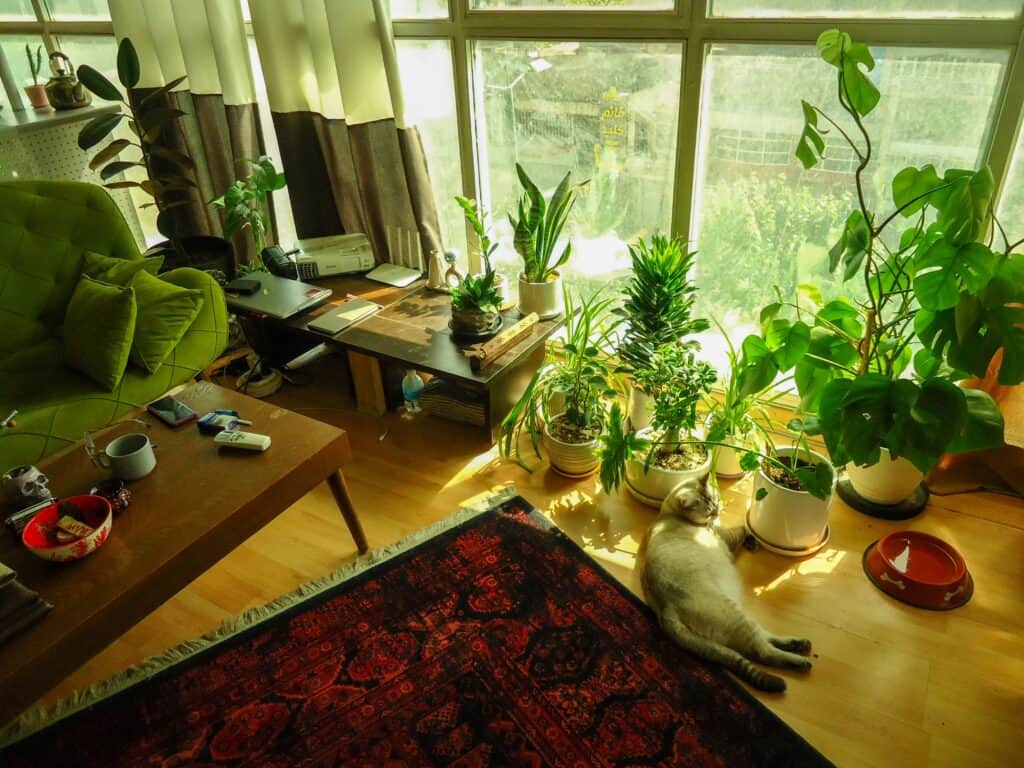Check how old is your pet in human years using our Pet Age Calculator.
Bamboo plants are often celebrated for their beauty and versatility, but if you’re a pet owner, you might be wondering if they’re safe for your furry friends.
With so many plants out there, it’s crucial to know which ones can coexist peacefully with pets. I’ve done the research to help you understand the potential risks and benefits of having bamboo in your home.
Table Of Contents
Are Bamboo Plants Pet Friendly: Understanding Bamboo Plants
Bamboo plants belong to the Poaceae family, featuring numerous species that flourish in various climates. These fast-growing plants can reach impressive heights, often exceeding 30 feet, and exhibit a range of colors and textures in their foliage and stems.
Bamboo serves multiple purposes in landscaping and interior decor. Many people use bamboo in their gardens for privacy screens, windbreaks, or aesthetic appeal. Inside, bamboo’s natural beauty enhances homes, adding a touch of elegance to any space.
Bamboo plants are non-toxic to pets, specifically cats and dogs. Unlike many houseplants, they pose minimal risk if ingested, making them a safe choice for households with animals.
However, while bamboo isn’t harmful, excessive consumption could lead to digestive upset, so monitoring pet behavior around plants remains essential.
Understanding the specific types of bamboo is crucial. Some species might be more suitable for indoor settings than others, while certain varieties thrive outdoors.
For example, Fargesia species are ideal for smaller spaces, offering compact growth, while Phyllostachys varieties can grow taller, requiring more room.
Overall, including bamboo plants in homes with pets creates a safer environment, balancing aesthetics with pet-friendly living.
Are Bamboo Plants Safe for Pets?
Bamboo plants generally pose minimal risks to pets, making them a viable choice for households with furry companions. Understanding which bamboo species are safe and their toxicity levels is crucial for pet owners.
Toxicity Levels of Bamboo
True bamboo (Bambusoideae) species are non-toxic to pets, including cats, dogs, and horses. These plants can coexist in homes without jeopardizing pet health.
Contrastingly, both False Bamboo and Lucky Bamboo are exceptions. Lucky Bamboo (Dracaena sanderiana) contains compounds harmful to cats, leading to symptoms such as dilated pupils and abdominal pain if ingested.
Similarly, False Bamboo also harbors toxic elements that can induce moderate toxicity in pets. Awareness of these toxic species ensures better protection for pets.
Types of Bamboo Plants
- True Bamboo: Non-toxic to pets, supports air purification, and enhances home aesthetics.
- Lucky Bamboo: Toxic to cats, necessitates careful placement out of reach.
- False Bamboo: Toxic to pets, better to avoid entirely.
Monitoring pet interactions with bamboo is vital, even with non-toxic varieties, as excessive consumption may cause gastrointestinal issues.
Benefits of Bamboo Plants for Pet Owners
Bamboo plants offer several advantages for pet owners, enhancing the living environment while maintaining safety for pets. These benefits include air purification, aesthetic appeal, and low maintenance requirements.
Air Purification
Bamboo plants effectively remove indoor air pollutants, contributing to improved respiratory health for pets and humans alike.
Studies indicate that bamboo can filter toxins like formaldehyde and benzene, resulting in cleaner air quality in the home.
An area with bamboo plants can significantly reduce airborne contaminants, promoting a healthier environment, especially for pets that spend considerable time indoors.
Aesthetics and Comfort
Bamboo adds an exotic and elegant touch to various settings, enhancing the beauty of homes and gardens. The natural greenery creates a calming atmosphere, fostering a comfortable environment for both pets and their owners.
Additionally, the ability to thrive in diverse lighting conditions makes bamboo a versatile option for enhancing interior decor without compromising pet safety.
Tips for Keeping Pets Safe Around Bamboo
- Confirm you have true bamboo species, such as Golden Bamboo (Phyllostachys aurea) or Black Bamboo (Phyllostachys nigra), in your home or garden. This distinction prevents poisoning risks from toxic look-alikes like Lucky Bamboo and Heavenly Bamboo.
- Monitor pets’ behaviors to prevent excessive eating of bamboo. True bamboo is non-toxic, but large quantities may lead to mild gastrointestinal upset.
- Choose pet-safe fertilizers for plant care, as many common fertilizers contain harmful chemicals that can endanger pets if ingested.
- Use bamboo palms, which are also pet-safe, in indoor low-light settings. They provide an excellent companion to true bamboo plants.
- Appreciate bamboo for its air-purifying capabilities. Bamboo plants help improve indoor air quality, benefitting both pet health and overall household wellness.
Key Takeaways
- Bamboo plants are generally non-toxic to pets, making them a safe option for households with cats and dogs.
- Not all bamboo species are pet-friendly; True Bamboo (Bambusoideae) is safe, while Lucky Bamboo and False Bamboo contain toxic compounds.
- Monitoring pet interactions with bamboo is essential, as excessive consumption can lead to gastrointestinal issues, even with non-toxic varieties.
- Bamboo enhances indoor air quality by removing pollutants, contributing to a healthier environment for both pets and humans.
- Choosing the correct species and employing pet-safe fertilizers can further ensure a safe living space for your furry companions.
- Bamboo’s aesthetic appeal adds a calming and elegant touch to home decor, creating a comfortable atmosphere for both pets and their owners.
Conclusion
Bamboo plants can be a fantastic addition to homes with pets as long as you choose the right species. True bamboo is non-toxic and offers numerous benefits like air purification and aesthetic appeal.
However it’s crucial to stay informed about which types of bamboo are safe and which are not.
Monitoring your pets around plants is essential to prevent any potential digestive issues from excessive munching.
By following the tips provided and ensuring you have the right bamboo species, you can enjoy the beauty of these plants while keeping your furry friends safe and happy.
Embracing bamboo in your home can create a harmonious environment for both you and your pets.
Frequently Asked Questions
Is bamboo safe for pets?
Yes, true bamboo species (Bambusoideae) are non-toxic to pets, including cats and dogs. However, excessive consumption can lead to digestive upset, so it’s important to monitor your pets around these plants.
What types of bamboo are toxic to pets?
Both False Bamboo and Lucky Bamboo are toxic to pets. Lucky Bamboo (Dracaena sanderiana) can cause serious symptoms like abdominal pain in cats, while False Bamboo can induce moderate toxicity.
What are the benefits of having bamboo in pet-friendly homes?
Bamboo offers several benefits, including air purification, aesthetic appeal, and low maintenance requirements. It helps remove indoor air pollutants, creating a healthier environment for both pets and humans.
How can I ensure my pets are safe around bamboo plants?
To keep your pets safe, ensure you have true bamboo species, monitor their behavior to prevent excessive eating, use pet-safe fertilizers, and consider bamboo palms for low-light indoor settings.
Can bamboo plants improve indoor air quality?
Yes, bamboo effectively filters toxins like formaldehyde and benzene, improving indoor air quality. This contributes to better respiratory health for both pets and their owners.





